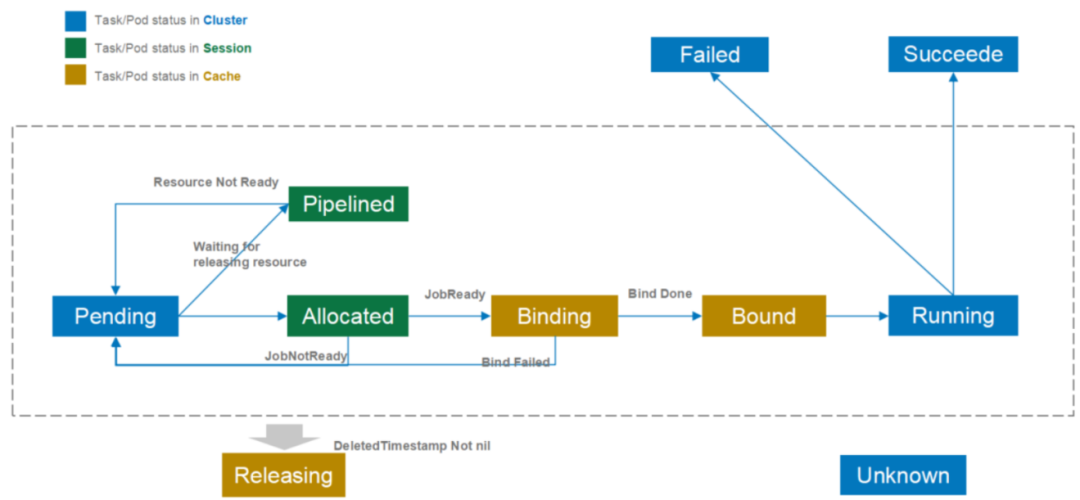Introduction
PodGroup is a group of pods with strong association and is mainly used in batch scheduling, for example, ps and worker tasks in TensorFlow. PodGroup is of a Custom Resource Definition (CRD) type.
Example
apiVersion: scheduling.volcano.sh/v1beta1
kind: PodGroup
metadata:
creationTimestamp: "2020-08-11T12:28:55Z"
generation: 5
name: test
namespace: default
ownerReferences:
- apiVersion: batch.volcano.sh/v1alpha1
blockOwnerDeletion: true
controller: true
kind: Job
name: test
uid: 028ecfe8-0ff9-477d-836c-ac5676491a38
resourceVersion: "109074"
selfLink: /apis/scheduling.volcano.sh/v1beta1/namespaces/default/podgroups/job-1
uid: eb2508f5-3349-439c-b94d-4ac23afd71ff
spec:
minMember: 1
minResources:
cpu: "3"
memory: "2048Mi"
priorityClassName: high-priority
queue: default
status:
conditions:
- lastTransitionTime: "2020-08-11T12:28:57Z"
message: '1/0 tasks in gang unschedulable: pod group is not ready, 1 minAvailable.'
reason: NotEnoughResources
status: "True"
transitionID: 77d5be3f-6169-4f86-8e65-0bdc621ce983
type: Unschedulable
- lastTransitionTime: "2020-08-11T12:29:02Z"
reason: tasks in gang are ready to be scheduled
status: "True"
transitionID: 54514401-5c90-4b11-840d-90c1cda93096
type: Scheduled
phase: Running
running: 1
Key Fields
minMember
minMember indicates the minimum number of pods or tasks running under the PodGroup. If the cluster resource cannot meet the demand of running the minimum number of pods or tasks, no pod or task in the PodGroup will be scheduled.
queue
queue indicates the queue to which the PodGroup belongs. The queue must be in the Open state.
priorityClassName
priorityClassName represents the priority of the PodGroup and is used by the scheduler to sort all the PodGroups in the queue during scheduling. Note that system-node-critical and system-cluster-critical are reserved values, which mean the highest priority. If priorityClassName is not specified, the default priority is used.
minResources
minResources indicates the minimum resources for running the PodGroup. If available resources in the cluster cannot satisfy the requirement, no pod or task in the PodGroup will be scheduled.
phase
phase indicates the current status of the PodGroup.
conditions
conditions represents the status log of the PodGroup, including the key events that occurred in the lifecycle of the PodGroup.
running
running indicates the number of running pods or tasks in the PodGroup.
succeed
succeed indicates the number of successful pods or tasks in the PodGroup.
failed
failed indicates the number of failed pods or tasks in the PodGroup.
Status

status-DAG
pending
pending indicates that the PodGroup has been accepted by Volcano but its resource requirement has not been satisfied yet. Once satisfied, the status will turn to running.
running
running indicates that there are at least minMember pods or tasks running under the PodGroup.
unknown
unknown indicates that among minMember pods or tasks, some are running while others are not scheduled. The reason could be due to the lack of resources. The scheduler will wait until ControllerManager starts these pods or tasks again.
inqueue
inqueue indicates that the PodGroup has passed validation and is waiting to be bound to a node. It is a transient state between pending and running.
Usage
minMember
In some scenarios such as machine learning training, you do not need all tasks of a job to be completed. Instead, when a specified number of tasks are completed, the job can be achieved. In this case, the minMember field is suitable.
priorityClassName
priorityClassName is used in preemptive priority scheduling.
minResources
In some scenarios such as big data analytics, a job can run only when available resources meet the minimum requirement. minResources is suitable for such scenarios.
Note
Automatic Creation
If no PodGroup is specified when a VolcanoJob is created, Volcano will create a PodGroup with the same name as the VolcanoJob.